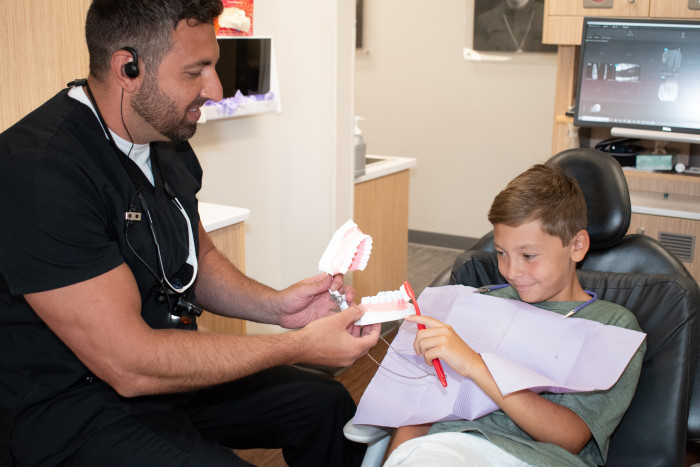

Our teeth, gums and mouths change as we get older. Maintaining good oral health is essential at every stage of life. While the fundamentals — brushing, flossing and regular dental checkups — remain the same, different age groups face unique challenges and may require specialized care. Be aware of potential issues and follow these tips to help ensure a lifetime of healthy smiles.
Children: Build a Foundation for Good Dental Care
We recommend introducing your child to the dentist around age 3. We offer a “happy visit” appointment where kids tour our office to get comfortable with visiting the dentist. As you instill the basics of good dental care in your kids, also be on the lookout for:
- Early childhood cavities, which can be caused by sugary drinks or prolonged bottle use
- Thumb-sucking or pacifier use, which can impact bite alignment
- Early tooth decay from poor brushing habits
Even before it’s time to bring your baby to the dentist, you can care for their mouths by cleaning their gums with a soft, damp cloth before teeth emerge and, as teeth grow in, brushing with a baby toothbrush and a tiny dab of fluoride toothpaste — about the size of a grain of rice. Other helpful tips include the following.
- Supervise your child’s brushing until they’re 6 to help guide them on proper technique.
- Schedule your child’s first dental visit by their first birthday and follow up with preventive care every six months.
- Feed your child a balanced diet and limit sugary snacks and drinks.
Young Adults: Establish Healthy Habits and Address Growth Issues
The teen years are a good time to address issues such as bite alignment and mouth crowding. Common dental issues for teens include:
- Braces and orthodontic treatment
- Wisdom tooth removal to prevent impaction and crowding
- Gum inflammation due to hormonal changes
- Dental injuries from sports
- Increased risk of cavities and enamel erosion from poor diet choices
In addition to brushing twice daily and flossing at least once daily, young adults should:
- Use an orthodontic toothbrush or water flosser to clean hard-to-reach areas if they have braces.
- Use a mouthguard for contact sports to prevent injuries to their teeth and mouth.
- Avoid excessive sugary and acidic foods to prevent enamel erosion.
- Have their wisdom teeth evaluated by a dentist and continue regular preventive appointments every six months.
- Avoid vaping and tobacco products, which can lead to gum disease and oral cancer.
Adults: Maintain Healthy Teeth and Gums
As we get older, the risk of cavities and gum disease increases. Some other conditions that may appear include:
- Tooth decay from aging fillings
- Dry mouth
- Root damage
- Grinding or clenching teeth, which can lead to jaw muscle and joint problems
- Stains from prolonged coffee, tea and wine consumption or tobacco use
- Tooth loss from poor oral hygiene or other underlying health conditions
In addition to visiting the dentist regularly for preventive care and eating a balanced diet, the following tips can be helpful during this stage.
- Use an antibacterial mouthwash to fight plaque buildup.
- Wear a night guard to help with teeth grinding.
- Consider professional teeth whitening for stain removal.
- Drink plenty of water and chew sugar-free gum to promote saliva production if you have dry mouth.
Seniors: Preserve Oral Health and Function
Our teeth naturally weaken over time. Maintaining the integrity of our mouths is important as we age. Common oral health issues for seniors include:
- Tooth loss and the need for dentures or implants
- Dry mouth from medications, which increases cavity risk
- Gum recession, leading to tooth sensitivity
- Higher risk of oral cancer
Even if you have dentures or implants, you should continue to get regular preventive care.
- Keep dentures clean and remove them at night to prevent infections.
- Stay hydrated and ask your dentist about options to care for dry mouth.
- Get screened for oral cancer and report any sores or lumps that don’t heal to your doctor.
By addressing age-specific concerns and following proper dental care routines, you can protect your teeth and gums at every stage of life. No matter your age, regular dental checkups and good oral hygiene habits will ensure a healthy and confident smile for years to come. If it’s time for your next dental visit, don’t wait — call us today at 785-539-5949 to schedule an appointment and keep your family’s oral health on track!